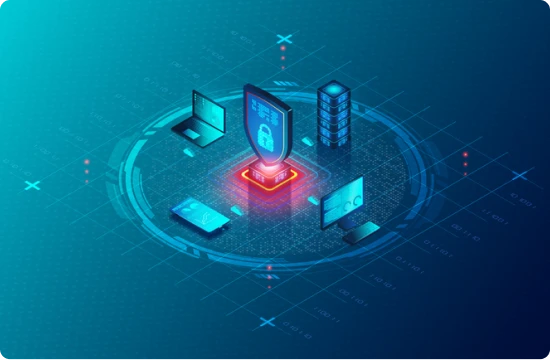Key Features of an EDR Agent
An Endpoint Detection and Response (EDR) agent is a cornerstone of modern cybersecurity strategies, offering comprehensive features designed to protect endpoints from advanced threats. These features enable organizations to monitor, detect, respond to, and mitigate risks effectively. Below, we delve into the key capabilities that make EDR agents essential in today’s threat landscape.
- Real-Time Threat Detection EDR continuously monitor endpoint activities to identify potential threats as they occupy analyzing behaviors, patterns, and anomalies, EDR agents detect suspicious activities, such as unauthorized access attempts, unusual file modifications, or abnormal network connectionThis real-time detection capability is critical for identifying threats before they cause significant damage.
- Behavioral Analysis Unlike traditional antivirus solutions that rely on known threat signatures, EDR agents employ advanced behavioral analysiThis involves monitoring how files and applications interact with the system to detect malicious intenBehavioral analysis enables the identification of zero-day attacks and previously unknown threats that traditional methods might miss.
- Comprehensive Threat Visibility EDR agents provide detailed insights into endpoint activities, including file executions, registry changes, and network communicationThis visibility allows security teams to gain a full understanding of the threat’s scope, helping them to analyze the root cause and take proactive measures to prevent future incidents.
- Automated Response Capabilities EDR agents are equipped with automated response mechanisms to contain and mitigate threats quicklThese responses can include isolating infected endpoints, terminating malicious processes, or rolling back systems to a pre-attack statAutomation reduces response times and minimizes potential damage.
- Forensic Data Collection When a threat is detected, the EDR agent collects forensic data such as logs, file hashes, and system snapshotThis information is vital for post-incident analysis, allowing organizations to understand how the attack occurred and take steps to improve their defenses.
- Integration with Threat Intelligence EDR integrates with global threat intelligence feeds to stay updated on the latest attack vectors and indicators of compromise (This integration enables proactive defense mechanisms by identifying and blocking known malicious entities before they can harm the system.
- Scalability and Flexibility EDR agents are designed to work seamlessly across diverse IT environments, including on-premises, cloud-based, and hybrid setupTheir scalability ensures that organizations of all sizes can benefit from robust endpoint protection without compromising performance
Benefits of Using an Agent in Cybersecurity
Endpoint Detection and Response (EDR) agents play a crucial role in enhancing an organization’s security posture. Below are the key benefits of using an EDR agent in cybersecurity:
- Proactive Threat Detection One of the standout benefits of EDR agents is their ability to detect threats proactively. By continuously monitoring endpoint activities, they can identify suspicious behaviors and potential risks before they escalate. This proactive approach minimizes the chances of a successful attack and reduces the overall impact of threats on the organization.
- Enhanced Incident Response EDR agents streamline incident response by providing automated containment measures, such as isolating compromised endpoints and terminating malicious processes. They also generate detailed reports and forensic data that help security teams investigate and respond to incidents more efficiently, reducing downtime and mitigating damage.
- Comprehensive Endpoint Visibility EDR agents provide unparalleled visibility into endpoint activities, offering a centralized view of processes, files, network connections, and user behavior. This transparency enables IT and security teams to detect anomalies quickly and gain a deeper understanding of potential vulnerabilities across the network.
- Protection Against Advanced Threats Traditional antivirus solutions often fall short against advanced threats like zero-day exploits, ransomware, and fileless malware. EDR agents use behavioral analysis, machine learning, and threat intelligence to identify and block these sophisticated attacks, offering robust protection against emerging cyber risks.
- Cost-Effective Security Investing in an EDR agent can save organizations significant costs associated with data breaches, system downtime, and reputational damage. By detecting and mitigating threats early, EDR agents reduce the financial and operational impact of cybersecurity incidents, providing long-term value.
- Improved Compliance and Reporting For organizations subject to regulatory requirements, EDR agents simplify compliance by providing detailed logs, audit trails, and reports. These features make it easier to demonstrate adherence to cybersecurity standards and respond to audits or investigations.
- Seamless Integration with Existing Security Tools EDR agents are designed to integrate seamlessly with other security tools, such as SIEM (Security Information and Event Management) systems, firewalls, and threat intelligence platforms. This integration enhances an organization’s overall security ecosystem, ensuring a more comprehensive defense strategy.
- Scalability for Growing Organizations Whether an organization has a few endpoints or thousands, EDR agents are scalable to meet their needs. They can adapt to various environments, including on-premises, cloud, or hybrid setups, making them a versatile solution for businesses of all sizes.
- Continuous Learning and Improvement Modern EDR agents utilize machine learning to improve their detection and response capabilities over time. By analyzing past incidents and adapting to new threat patterns, they become increasingly effective at identifying and mitigating risks.
EDR vs Traditional Antivirus
While traditional antivirus (AV) software has been a staple of cybersecurity for decades, Endpoint Detection and Response (EDR) agents offer a more advanced approach. Below, we compare EDR agents and traditional antivirus solutions to highlight their differences and advantages.
- Threat Detection Capabilities
- Traditional Antivirus: Relies primarily on signature-based detection to identify known malware. It compares files against a database of known threats but struggles with detecting new or unknown threats like zero-day exploits or fileless malware.
- EDR Agent: Goes beyond signature-based detection by using behavioral analysis, machine learning, and heuristics to identify suspicious activities. This enables EDR agents to detect advanced and unknown threats in real time.
- Scope of Protection
- Traditional Antivirus: Focuses on known malware and viruses, offering limited protection against modern threats such as ransomware or insider attacks.
- EDR Agent: Provides comprehensive protection by monitoring all endpoint activities, including file execution, registry changes, and network communications, ensuring coverage against a wide range of threats.
- Incident Response
- Traditional Antivirus: Primarily designed for detection and removal of malware. Response capabilities are often limited to quarantining infected files.
- EDR Agent: Offers advanced incident response capabilities, such as isolating endpoints, terminating malicious processes, and rolling back affected systems to a pre-attack state. EDR agents also generate forensic data to aid in post-incident investigations.
- Real-Time Monitoring
- Traditional Antivirus: Runs periodic scans and operates passively until a known threat is detected.
- EDR Agent: Continuously monitors endpoint activity in real time, providing instant alerts and responses to emerging threats. This proactive approach minimizes the window of exposure.
- Threat Intelligence Integration
- Traditional Antivirus: Typically relies on static threat databases that require frequent updates to remain effective.
- EDR Agent: Integrates with global threat intelligence feeds and continuously learns from new threats, ensuring up-to-date protection against evolving attack vectors.
- Advanced Threats
- Traditional Antivirus: Ineffective against sophisticated attacks like fileless malware, advanced persistent threats (APTs), and polymorphic malware.
- EDR Agent: Designed to detect and respond to advanced threats using techniques like behavioral analytics and endpoint visibility.
- Scalability and Flexibility
- Traditional Antivirus: Best suited for standalone or small-scale endpoint protection. Managing AV solutions across large networks can be challenging.
- EDR Agent: Scalable to protect thousands of endpoints across on-premises, cloud, and hybrid environments, making it ideal for growing organizations.
- Forensic Capabilities
- Traditional Antivirus: Lacks detailed forensic capabilities, offering minimal insights into how a threat entered or spread within the system.
- EDR Agent: Captures comprehensive forensic data, such as logs, file hashes, and threat timelines, enabling deeper investigation and future prevention.






